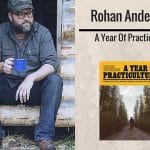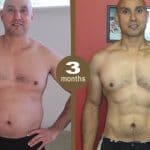What should we be eating for a more healthy and prosperous life? Seems like the million dollar question these days. If this is a question you find yourself asking, then I highly recommend reading this article featuring Dr Rod Taylor (pictured below), co-creator of Low Carb Down Under (LCDU) an evidence-based online resource to help you understand if a low carb, high fat approach to nutrition will lead to optimal health.
 Have you always lived a low carb lifestyle, if not, what inspired you to change?
Have you always lived a low carb lifestyle, if not, what inspired you to change?
I thought I was a pretty healthy eater, having muesli, wholemeal bread, pasta and rice and maybe 5 pieces of fruit a day. I didn’t realise until I stopped that all that fruit was giving me bad irritable bowel symptoms.
I had been gaining weight over about 10 years up to 80kg which gave me a spare tyre that I wasn’t too keen on. I read David Gillespie’s Sweet Poison and immediately dropped my sugar consumption. 7 kg just fell off. However over time my weight wanted to creep back on a little and I read more about reducing other refined carbs. I cut them and my weight dropped down to 71kg. With a bit more tweaking it is now around 69kg.
By eating a low carb lifestyle, have you noticed significant change in your eating habits and any effects on your own health?
For sure. I love the extra energy and clarity. I get a lot done in addition to my full time work as an anaesthetist, such as organising events through LCDU as well being a home and family person, and some music interests.
Having been on a low carb, moderate protein higher fat diet for quite a while I just don’t seem to get hungry as much. I’ve recently been experimenting measuring my urinary and blood ketone levels. Jimmy Moore has been blogging about his positive experience of weight loss with nutritional ketosis and will be talking about it at the LCDU seminars. A number of people I respect do it like Dr Andreas Eenfeldt. Also Dr Jeff Volek has been doing it for years and is in great shape. For me, so far so good!
As a doctor what are your thoughts on the relationship between diet and ill health?
If you’d asked that 10 years ago I’d have said diet is related to about 50% of ill health. Now I’m thinking 90% plus. Resources on the LCDU website mention depression, asthma, arthritis, ADD and more. These are now on the radar as having dietary factors causing or contributing to them. And the science seems to be increasingly supporting this view.
You mentioned you follow a paleo diet, what would you eat in a typical day?
Paleo diet does seem to mean different things to different people. I still have some dairy though I have cut my milk consumption.
- Breakfast: bacon and cheese omelette (lots of chopped parsley/ baby spinach mixed through) cooked in plenty of butter. Maybe some full fat yoghurt with a slosh of cream on it with blended nut mix and a few blueberries.
- Lunch: Last night’s meat leftovers with two good handfuls of salad vegetables, and some raw beans, capsicum. Maybe some nuts. I’ve got to watch the nuts as I can tuck a lot of them away pretty quickly without thinking.
- Dinner: Meat and veggies, maybe more salad. I increased my salad veggies after watching Dr Terry Wahls Youtube “Minding Your Mitochondria”. 17 minutes of essential viewing.
And maybe some cheese and one or two pieces of 85% dark chocolate.
If someone was looking to improve their diet, what would you suggest?
Cut added sugar to almost none. The average Australian is having 30 plus teaspoons per day! The American Heart Association recommends a prudent upper level of 6 teaspoons for women and nine for men. I’d have less than 2 or 3 per day myself.
Reduce your bread, pasta, rice and potatoes. The average Aussie is having about 300 grams of carbs a day, and almost all of that is the more refined type. Try 50 grams per day mostly from non starchy vegetables. You may be OK with a bit more. You may need to cut to a lower allowance. Each of us has to figure this out for ourselves, to optimise our weight, our health markers and our general well-being. There is a fair bit of detail that ultimately we all need to get our heads around, so following great blogs, (like 180 Nutrition!), reading books, networking with others of like mind and coming along to seminars like LCDU all help.
Don’t overdo the protein, keep it to say 20% of total calories. Some amino acids feed into glucose production. Hyperglycaemia looks like the mechanism for a whole lot of bad stuff! Don’t have a whopping steak with a side salad. Have a modest steak with a whopping side of salad and non starchy vegetables.
Eat lots of animal fats. Saturated fat is good! The greatest health blunder of the last 100 years has been the advice to greatly reduce saturated fat (Read more on this here). Don’t cut the tails off the chops. Great grandma didn’t and she was skinny. I like some coconut oil every day.
A number of articles have been appearing in the medical literature questioning the old conventional wisdom around saturated fat.
Industrially produced polyunsaturated seed oils with higher omega levels have a big cloud over them. They are a major component of processed food. Avoid them like the plague!
Eat whole healthy foods like meat, eggs, non-starchy vegetables, nuts, modest amounts of fruit (too much sugar). When you are in good shape you can probably bend the rules a little without harm.
What are your thoughts on future health statistics?
These look bleak. I see an average of about 30 patients a week for preoperative anaesthesia assessments. Mostly they are not where they need to be for good long term health. And the deterioration over the past 10 years is alarming. I think the outlook is grim. Dementia and type 2 diabetes will be the fate for many of us on our current trajectory. The personnel not to mention the financial cost will be crippling.
We need to optimise our own health and our families and friends. And over time hopefully this will influence or work colleagues and the wider community. If we don’t the result will be disaster.
But on a cheerier note, it is do-able!
Learn more about low carb nutrition here:
- Nina Teicholz: How We Got It Wrong! Why I Eat Saturated Fat & Exercise Less
- Jimmy Moore: Keto Clarity & Low Carb Living
- Should Everyone Be Low Carb? End the Confusion Now with Dr Peter Brukner



 Have you always lived a low carb lifestyle, if not, what inspired you to change?
Have you always lived a low carb lifestyle, if not, what inspired you to change?




2 Replies to “Can We Live Longer On A Low Carb Diet?”
Nice Post! It’s always good to keep an eye on your carb intake.
Comments are closed.